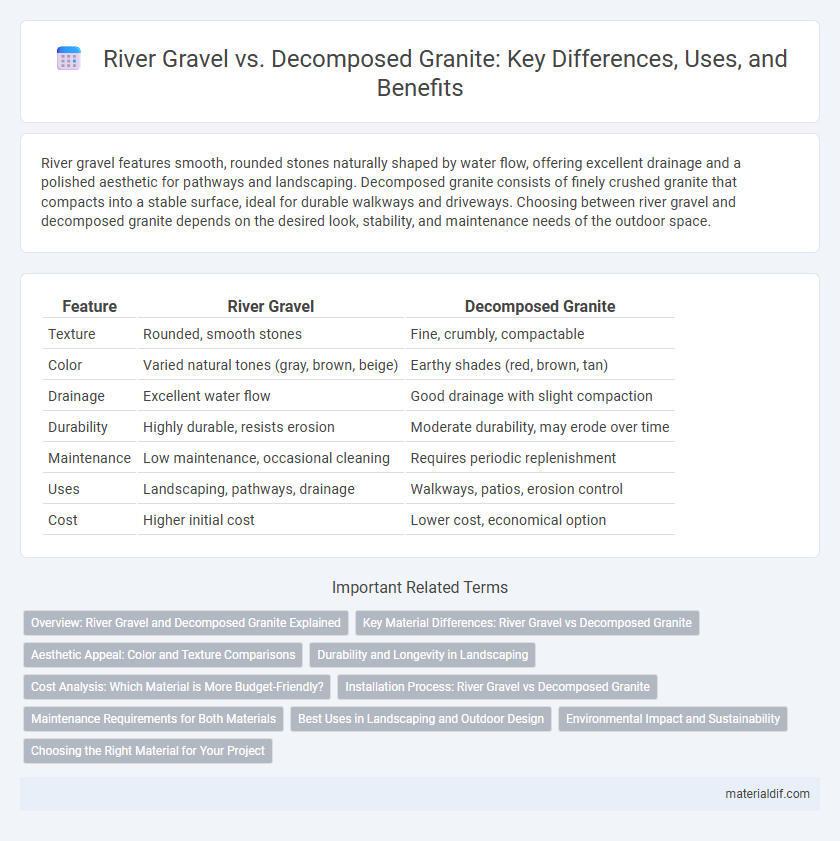River gravel features smooth, rounded stones naturally shaped by water flow, offering excellent drainage and a polished aesthetic for pathways and landscaping. Decomposed granite consists of finely crushed granite that compacts into a stable surface, ideal for durable walkways and driveways. Choosing between river gravel and decomposed granite depends on the desired look, stability, and maintenance needs of the outdoor space.
Table of Comparison
| Feature | River Gravel | Decomposed Granite |
|---|---|---|
| Texture | Rounded, smooth stones | Fine, crumbly, compactable |
| Color | Varied natural tones (gray, brown, beige) | Earthy shades (red, brown, tan) |
| Drainage | Excellent water flow | Good drainage with slight compaction |
| Durability | Highly durable, resists erosion | Moderate durability, may erode over time |
| Maintenance | Low maintenance, occasional cleaning | Requires periodic replenishment |
| Uses | Landscaping, pathways, drainage | Walkways, patios, erosion control |
| Cost | Higher initial cost | Lower cost, economical option |
Overview: River Gravel and Decomposed Granite Explained
River gravel features smooth, rounded stones formed by natural water erosion, offering excellent drainage and a polished aesthetic ideal for landscaping and pathways. Decomposed granite consists of weathered granite particles that create a compact, stable surface with a natural earthy tone, commonly used for driveways, trails, and garden beds. Both materials provide durability and versatility, but river gravel excels in decorative appeal while decomposed granite is favored for solid, walkable surfaces.
Key Material Differences: River Gravel vs Decomposed Granite
River gravel features smooth, rounded stones formed by natural water erosion, typically ranging in size from 1/4 to 2 inches, making it ideal for drainage and decorative landscaping. Decomposed granite consists of finely weathered granite particles creating a compact, sandy texture that hardens when compacted, offering stability for pathways and driveways. The primary material difference lies in river gravel's larger, non-compacting stones compared to decomposed granite's finer, compactable granules.
Aesthetic Appeal: Color and Texture Comparisons
River gravel showcases smooth, rounded stones with a wide color palette ranging from whites and grays to russets and blues, creating a vibrant, natural look. Decomposed granite offers a fine, sandy texture with earthy tones like reddish-browns and tans, promoting a rustic, uniform aesthetic. The choice between the two depends on whether a dynamic, multicolored surface or a consistent, subdued finish is preferred for landscaping or pathways.
Durability and Longevity in Landscaping
River gravel offers superior durability and longevity in landscaping due to its natural resistance to weathering and wear, maintaining its smooth texture and color over time. Decomposed granite, while aesthetically pleasing and easier to compact, tends to break down faster under heavy foot traffic and harsh weather conditions, leading to more frequent maintenance. Selecting river gravel ensures a longer-lasting, low-maintenance solution for pathways, driveways, and garden beds.
Cost Analysis: Which Material is More Budget-Friendly?
River gravel typically costs between $50 to $75 per ton, while decomposed granite ranges from $40 to $60 per ton, making decomposed granite generally more budget-friendly. Installation costs for decomposed granite are also lower due to its finer texture and easier compaction properties, reducing labor expenses. Long-term maintenance for river gravel may increase total costs because of displacement and the need for frequent replenishment.
Installation Process: River Gravel vs Decomposed Granite
River gravel installation involves laying a geotextile fabric followed by a base layer of crushed stone to ensure drainage and stability, then evenly spreading the smooth, rounded stones. Decomposed granite installation requires compacting the base soil, spreading the fine, angular particles, and compressing them with a roller or plate compactor to form a solid, stable surface. The compacted nature of decomposed granite makes it ideal for pathways and patios, while river gravel's loose texture provides excellent drainage for garden beds and decorative landscaping.
Maintenance Requirements for Both Materials
River gravel requires minimal maintenance, primarily occasional rinsing to remove dirt and debris, while decomposed granite demands regular upkeep to prevent erosion and compaction, such as periodic raking and reapplication of stabilizers. River gravel's durability and larger particle size contribute to its longevity with less frequent upkeep compared to the finer, more porous nature of decomposed granite that makes it prone to dust and displacement. Proper maintenance of decomposed granite ensures its compacted, stable surface, ideal for pathways and low-traffic areas, whereas river gravel works well in high-traffic zones with less frequent attention.
Best Uses in Landscaping and Outdoor Design
River gravel offers smooth, rounded stones ideal for pathways, garden beds, and water features, providing natural aesthetics and excellent drainage. Decomposed granite, composed of finely crushed rock, creates a compact, stable surface perfect for walkways, patios, and driveways due to its firm yet permeable texture. Both materials complement landscaping by enhancing soil erosion control, but river gravel suits wet environments better while decomposed granite excels in dry, arid climates.
Environmental Impact and Sustainability
River gravel offers higher environmental sustainability than decomposed granite due to its natural, rounded form that requires minimal processing and reduces erosion risks in landscaping projects. Decomposed granite, produced by crushed granite, often involves energy-intensive extraction and processing, increasing its carbon footprint and potential habitat disruption. Choosing river gravel supports biodiversity by maintaining natural riverbed compositions and promoting water filtration, making it a more eco-friendly option for sustainable construction and landscaping.
Choosing the Right Material for Your Project
River gravel offers smooth, rounded stones ideal for drainage and aesthetic landscaping, while decomposed granite provides a compact, stable surface suitable for pathways and patios. River gravel's natural water permeability helps prevent puddling, making it preferred for garden beds and erosion control. Decomposed granite compacts firm enough for light traffic areas, making it economical and easy to maintain for walkways and driveways.
River Gravel vs Decomposed Granite Infographic

 materialdif.com
materialdif.com